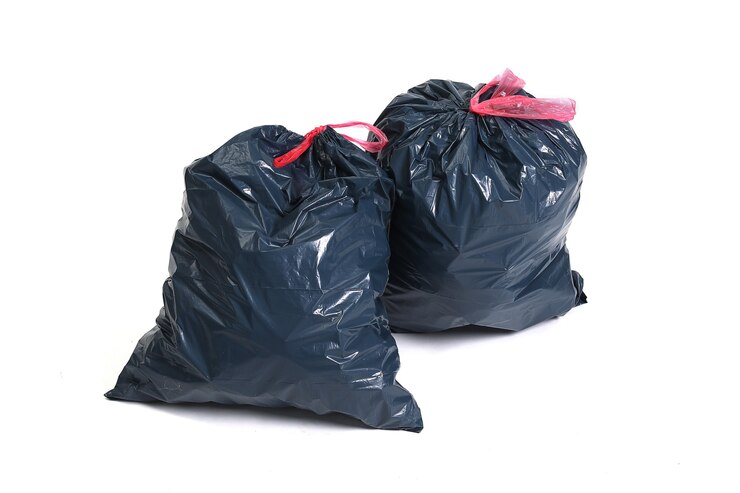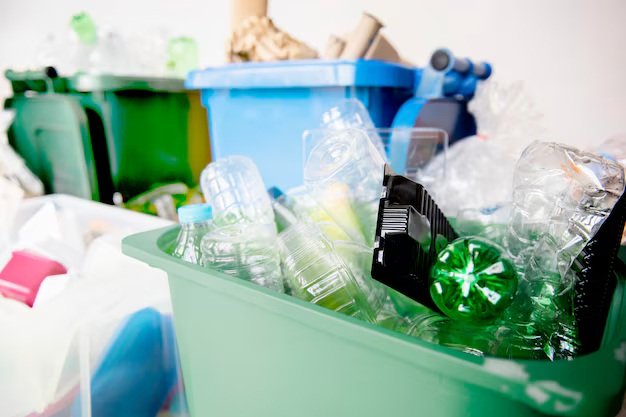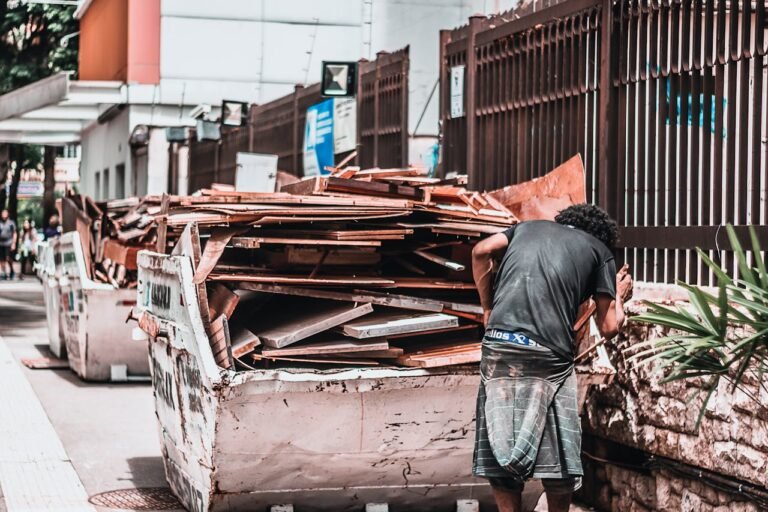What Is a Biodegradable Garbage Bag and Why Use It?
Biodegradable options are emerging as some of the most eco-friendly solutions to reduce solid waste at landfills. Among these are biodegradable options for garbage bags, which are a sustainable alternative to conventional plastic garbage bags. Designed to decompose under natural conditions, these bags come in different sizes that fit perfectly in trash cans—they offer a better solution to the global waste management crisis. This article explores what biodegradable garbage bags are, how they differ from other waste disposal options, and why they are essential for a greener future.

In This Article
- What Is a Biodegradable Garbage Bag?
- What Are Biodegradable Garbage Bags Made Of?
- Bioplastics and Their Components
- Comparative Analysis: Biodegradable vs. Conventional Plastic Bags
- Why Use a Biodegradable Garbage Bag?
- The Science Behind Biodegradation: Breaking Down the Process
- Advantages of Biodegradable Garbage Bags
- Challenges and Misconceptions about Biodegradable Garbage Bags
- Comparison of Biodegradable Garbage Bags to Other Alternatives
- Global Perspectives on Waste Management and Biodegradable Bags
- Tips for Consumers: How to Choose and Dispose of Biodegradable Garbage Bags
- Addressing Misconceptions about Biodegradable Plastics
- Challenges of Biodegradable Garbage Bags
- How to Properly Dispose of Biodegradable Garbage Bags
- Future of Biodegradable Garbage Bags: Innovation on the Horizon
- Conclusion
What Is a Biodegradable Garbage Bag?
Biodegradable garbage bags are a greener alternative to conventional single-use plastic garbage bags. Unlike plastic bags, which take a long time to decompose, biodegradable options are designed to break down naturally within a few months to a couple of years, depending on environmental conditions. These bags come in different sizes and are durable enough to hold both kitchen and household trash
Biodegradable garbage bags are environmentally safe to use –they break down into non-toxic components like biomass, water, and carbon dioxide when exposed to the right conditions. These easy-to-decompose bags are often made from organic materials like corn starch and other biodegradable additives.
What Are Biodegradable Garbage Bags Made Of?
Biodegradable garbage bags are made from bioplastics, materials derived from plant-based sources like corn starch, sugarcane, or potato starch. Some products also contain polylactic acid (PLA), a biopolymer obtained from fermented plant starches. Both PLA and starch-based bioplastics are designed to degrade much faster than petroleum-based plastics.
These garbage bags can also be made from recycled plant materials that have reached the limit of recycling potential.
| Material | Source | Degradation Time (In Ideal Conditions) | Environmental Benefit |
| Corn Starch | Corn Plants | 3–6 months | Reduced carbon emissions; renewable source |
| Polylactic Acid | Fermented Plant Starches | 6 months – 2 years | Fully compostable in industrial facilities |
| Sugarcane | Sugarcane Plants | 3–12 months | Lowers reliance on fossil fuels |
| Potato Starch | Potato Plants | 3–6 months | Biodegrades into non-toxic components |
Bioplastics and Their Components
Bioplastics are an essential material for producing biodegradable garbage bags. More environmentally friendly than petroleum-based plastics, bioplastics can degrade faster under specific conditions, such as high temperatures (around 50 to 60 degrees Celsius) and sufficient moisture levels, for optimal breakdown.
Although using bioplastics to produce garbage bags makes them more eco-friendly, it’s important to understand their limitations. In industrial composting facilities, bioplastics can fully decompose within a few weeks to months. However, in natural environments such as landfills, decomposition can take much longer. Moreover, without sufficient oxygen, some biodegradable plastics may emit methane.
Comparative Analysis: Biodegradable vs. Conventional Plastic Bags
| Type of Bag | Material | Degradation Time | Environmental Impact | Carbon Emission |
| Biodegradable Garbage Bag | Corn Starch or PLA | 3–6 months (in industrial composting) | Breaks down into natural components | 0.8 tons per production cycle |
| Conventional Plastic Bag | Petroleum-based Plastics | 100–500+ years (in nature) | Contributes to microplastics in oceans | 4 tons per production cycle |
Learn More: 10 Best Eco-Friendly Alternatives to Ziploc Bags for a Greener Home
Why Use a Biodegradable Garbage Bag?
Plastic Waste Crisis
Our planet is choking on plastic, as millions of tons of this material are dumped in landfills and the ocean every year. According to the United Nations Environment Programme (UNEP), approximately 11.2 billion tons of solid waste is collected globally each year, and the decay of the organic portion of this waste contributes to 5% of global greenhouse gas emissions.
Conventional plastics will not decompose in our lifetime—they will only break down into microplastics that pollute waterways, harm marine species, and even enter the food chain. Single-use plastics continue to litter landfills, and poor waste management practices in densely populated areas result in more plastic waste being dumped into streams, rivers, and lakes, where it eventually flows into the ocean.
Reducing the Environmental Impact
Global plastic pollution can be reduced if sustainable options like biodegradable garbage bags are widely accepted over conventional plastic ones. The world faces a growing plastic waste crisis, with densely populated areas practising poor waste management being the most affected.
Case Study: Malaysia’s Waste Problem
Malaysia provides a stark example of the environmental consequences of illegal waste disposal. Poor waste management can have devastating effects on the environment and human health. In December 2021, parts of Malaysia experienced severe flooding due to clogged drains and waterways filled with plastic waste. Although the Malaysian government spends about 40 to 60% of its annual budget on waste management, the country still suffers from environmental pollution due to ongoing poor waste management practices.
The Science Behind Biodegradation: Breaking Down the Process
To clearly understand how biodegradable garbage bags break down under specific conditions, it’s important to explore the science behind biodegradation. Biodegradation occurs when microorganisms in the environment decompose materials into simpler compounds. For biodegradable plastics, this process can happen through two pathways: aerobic degradation (in the presence of oxygen) and anaerobic degradation (without oxygen, typically in landfills).
Conditions for Biodegradation:
- Temperature: Biodegradable plastics need temperatures between 50–60°C (122–140°F) for optimal decomposition.
- Moisture: A moisture level of 60–70% is ideal for accelerating the breakdown process.
- Microbial Activity: The presence of active microorganisms is crucial for the material to be broken down completely.
However, if these conditions are not met, such as in regular landfills or the ocean, biodegradable plastics may not degrade as quickly as advertised.
Real-World Example: European Biodegradable Plastics Testing Standards
In Europe, biodegradable plastics are tested under EN 13432 standards, which guarantee that these plastics will degrade in controlled composting environments within six months. However, without proper disposal methods, such as industrial composting, many biodegradable plastics may not decompose as expected, similar to conventional plastics.
Advantages of Biodegradable Garbage Bags
#1. Waste Reduction
One of the main advantages of biodegradable garbage bags is their ability to reduce the amount of waste that ends up in landfills. Household waste makes up a large portion of landfill waste. In the United Kingdom, for example, over 30 million tons of household waste are generated each year, with 35% consisting of kitchen and garden waste.
According to reports, the average American throws away their body weight in rubbish every month. With a growing population and thriving industries that rely on non-biodegradable packaging, switching to biodegradable options for garbage bags can effectively reduce the rate at which waste accumulates in landfills and waterways.
#2. Reduction in Carbon Emissions
Compared to conventional plastic waste bags, biodegradable bags have a smaller carbon footprint. Their manufacturing process generates approximately 0.8 tons of carbon emissions, compared to 4 tons of CO2 produced in the making of regular plastic garbage bags. This highlights the environmental impact difference between biodegradable and ordinary plastic garbage bags.
#3. Non-Toxic and Safer for Wildlife
The view at every landfill is filled with conventional plastic bags. Plastic bags don’t fully decompose but instead break down into microplastics, polluting the environment and the ocean. Plastic debris in the ocean poses a threat to marine life, especially endangered species. Floating plastic debris is often mistaken for food by marine species, leading them to ingest it or become entangled in it, which frequently results in injury or death. Biodegradable bags are a safer option, as they fully decompose under the right environmental conditions without leaving harmful microplastics behind.
Learn More: How Biodegradable Plastic Bags Impact the Environment: A Comprehensive Analysis
#4. Sustainable and Renewable Materials
Since these garbage bags are made from plant-based materials, they support a more sustainable and circular economy. Using biodegradable products reduces our reliance on fossil fuels and promotes the use of renewable materials that can be replenished.
#5. Less Pollution
Biodegradable materials easily and naturally decompose without leaving any toxic residue. Their ability to completely degrade over time makes biodegradable materials a better alternative to petroleum-based plastic, which contaminates the soil and water with microplastics. Compared to conventional plastic garbage bags, biodegradable options are far better and generate little to no pollution.
Challenges and Misconceptions about Biodegradable Garbage Bags
#1. Misleading Labels
False advertising can be misleading. For example, not all products labelled as ‘biodegradable’ are truly what they claim to be. Some products may carry the ‘biodegradable’ label, but in reality, they only break down into microplastics rather than fully decompose naturally. To avoid purchasing substandard products, always look for certifications like the Biodegradable Products Institute (BPI), which ensures that products meet stringent standards for compostability and biodegradability.
#2. Specific Decomposition Conditions
Biodegradable garbage bags require specific environmental conditions to start decomposing – they require the presence of heat, oxygen, and moisture. These bags break down quickly in industrial composting facilities, but when exposed to the natural environment or dumped in landfills, decomposition is much slower and may result in the emission of methane.
#3. Limited Infrastructure
One of the major challenges that often delays the decomposition of biodegradable garbage bags is the lack of infrastructure providing ideal environmental conditions for decomposition in many cities. Without proper composting facilities, these garbage bags may still end up in landfills, where decomposition is significantly delayed.
#4. Are Biodegradable Plastics Always Better?
According to a PDF document by the World Wildlife Fund (WWF), while biodegradable plastics are a significant improvement over traditional plastics, they are not a perfect solution. If poorly managed, biodegradable plastics can contribute to devastating environmental problems, particularly in regions that lack the infrastructure to ensure proper decomposition. To maximise the benefits of biodegradable plastics, these materials must be properly disposed of, preferably in composting facilities.
Comparison of Biodegradable Garbage Bags to Other Alternatives
#1. Compostable Garbage Bags
Compostable bags are similar to biodegradable ones, but they meet stricter criteria for decomposition. Compostable products are required to break down into non-toxic components within a specified time frame in a composting environment, without leaving any harmful residue behind.
- Pros: Compostable bags degrade faster in composting environments and help improve soil health by creating nutrient-rich compost.
- Cons: Compostable products require specific composting conditions (heat, moisture, and oxygen) and are not suitable for disposal in landfill sites.
#2. Reusable Garbage Bags
Reusable bags made from materials like fabric or silicone are designed for long-term use. They are durable for rewashing and can be reused over and over again.
- Pros: Reusable bags are a better alternative to replace single-use plastic bags.
- Cons: The bags are less practical for household waste disposal, particularly for wet or food waste that may have a bad odour and attract pests.
#3. Conventional Plastic Bags
Conventional plastic bags are still widely used for various purposes, and once discarded, they break down into microplastics that sometimes enter the food chain.
- Cons: Long-lasting environmental harm, contributing to plastic pollution and greenhouse gas emissions.
- Pros: Regular plastic bags are cheap, lightweight, widely available, and convenient to use.
Global Perspectives on Waste Management and Biodegradable Bags
Plastic pollution has prompted governments to implement strict regulations to reduce plastic waste. In Europe, these regulations on single-use plastics have led to a shift, with more people opting for biodegradable and compostable materials. In 2019, the European Union issued a directive to ban certain single-use plastics by 2021. Items banned by the EU include plastic bags, straws, and cutlery.
#1. The United Kingdom’s Push for Biodegradable Plastics
Ranked among the top five greenest countries in the world, the UK’s waste management initiatives and use of biodegradable plastics have become integral parts of its efforts to meet its Net Zero emissions target by 2050. In 2020, the UK banned single-use plastics and encouraged businesses to switch to compostable and biodegradable packaging. Local councils in the UK now provide compostable waste collection services, ensuring that biodegradable bags reach designated facilities for proper disposal.
According to DEFRA, the UK’s Department for Environment, Food & Rural Affairs, transitioning to biodegradable plastics could help reduce the country’s annual 11 million tonnes of waste by 30%.
#2. Sweden’s Waste-to-Energy Model
Sweden is a global leader aiming to become carbon neutral in the next few decades. The country’s innovative waste-to-energy model primarily focuses on converting biodegradable and organic waste into energy for heating homes. In 2019, the Scandinavian nation’s municipalities reported that 99% of household waste was diverted from landfills. A significant contributor to this success is Sweden’s adoption of biodegradable garbage bags, which are used in both households and industries.
#3. India’s Plastic Ban
India, the world’s largest producer of plastic waste and home to the largest population, implemented a nationwide ban on single-use plastics in July 2022. This ban has spurred the growth of the biodegradable plastic industry. Many businesses are also switching to eco-friendly alternatives to reduce plastic waste. However, the lack of adequate waste management infrastructure presents challenges in fully realising the benefits of biodegradable products.
Tips for Consumers: How to Choose and Dispose of Biodegradable Garbage Bags
- Look for Certifications: Always look for products that are certified by recognised bodies like the Biodegradable Products Institute (BPI) or European Bioplastics.
- Check Local Composting Facilities: To avoid disposing of biodegradable bags in landfills that lack the environmental conditions necessary for quick decomposition, ensure that your city or region has a composting facility before purchasing biodegradable garbage bags. If you live in an area without a designated composting facility, you may need to consider alternative waste management strategies, such as at-home composting.
- Proper Disposal: Biodegradable garbage bags should always be disposed of properly in composting bins or municipal composting programs where available. These bags should not be discarded in regular trash cans where decomposition is prolonged.
- Educate Yourself About Local Regulations: Many regions have specific waste management laws and regulations regarding biodegradable plastics. Make sure to stay informed about the rules in your area to ensure that you’re using these bags in the most environmentally friendly way possible.
Addressing Misconceptions about Biodegradable Plastics
Sometimes, understanding the difference between biodegradable, compostable, and degradable plastics can be confusing. Some consumers believe that biodegradable means the material will break down anywhere, but this isn’t always the case. Let’s clarify:
- Biodegradable: These are items designed to break down through microbial action under specific environmental conditions, such as in a composting facility.
- Compostable: A subset of biodegradable materials that must fully break down within a certain timeframe in industrial composting facilities, without leaving any toxic residue.
- Degradable: These materials break into smaller pieces but may not fully biodegrade, often leading to microplastic pollution.
Learn More: How Biodegradable and Compostable Materials Differ: A Complete Guide
Challenges of Biodegradable Garbage Bags
False Marketing Claims: Products may be labelled as “biodegradable” but fail to meet the necessary standards. Always look for certifications, such as the Biodegradable Products Institute (BPI) certification, which verifies that the product complies with industry standards for biodegradability.
Inadequate Infrastructure: Biodegradable plastics often need to be in industrial composting facilities to fully degrade. Many regions and cities lack these facilities, which presents a major challenge. In the United States, for example, only about 27% of cities have access to industrial composting. This means that more biodegradable garbage bags end up in landfills, where decomposition takes much longer.
How to Properly Dispose of Biodegradable Garbage Bags
- Use Composting Facilities: If you live in a city where compost collection services are available, make sure to send used biodegradable garbage bags to the designated facilities.
- Home Composting: While most biodegradable bags require industrial composting, some are suitable for home composting. Be sure to read the label and confirm that they are certified for home composting.
- Avoid Landfill Disposal: Biodegradable plastics may not fully degrade in landfills due to a lack of oxygen, moisture, and the necessary microbial conditions.
Expert Insight: Dr. Ellen MacArthur on Biodegradable Plastics
Dr. Ellen MacArthur, founder of the Ellen MacArthur Foundation, stresses the importance of infrastructure in realising the full potential of biodegradable garbage bags.
Dr. Ellen MacArthur’s work suggests that biodegradable plastics are not a silver bullet solution. Their environmental benefits rely heavily on the correct disposal methods and facilities. Without a widespread composting infrastructure, these bags may not degrade any faster than traditional plastics, especially in landfills.
Future of Biodegradable Garbage Bags: Innovation on the Horizon
Companies committed to sustainability goals are developing new solutions to promote the degradation of biodegradable plastics. Novamont is one of the leading manufacturers of bioplastics, focusing on biodegradable plastics that fully degrade in marine environments. This innovation has the potential to significantly reduce plastic pollution in the ocean.
Governments and municipalities are investing in composting infrastructure to accommodate more biodegradable waste. For example, the European Union has committed to increasing composting facilities as part of its Circular Economy Action Plan by 2030, potentially transforming the management of biodegradable plastics.
Conclusion
Biodegradable garbage bags offer a promising solution to reduce the harmful effects of plastic waste on the environment. They are a practical and eco-friendly option for households and businesses looking to make more sustainable choices. However, they are not a perfect solution and require proper disposal conditions to maximise their environmental benefits. By educating consumers, improving waste management infrastructure, and supporting global regulations on plastic use, biodegradable garbage bags can play a significant role in the fight against plastic pollution.
Switching to biodegradable garbage bags is a step toward reducing our reliance on petroleum-based plastics and decreasing the amount of waste in landfills and oceans. However, for this solution to be truly effective, both individuals and governments must commit to responsible waste management practices, ensuring that biodegradable products are disposed of correctly and that the necessary infrastructure is in place to support their widespread use.







